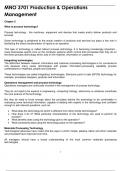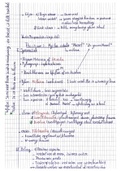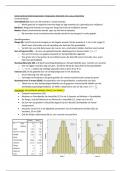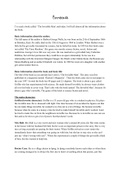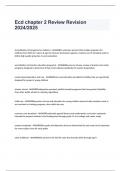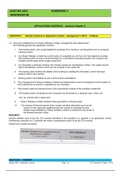MNO 3701 Production & Operations
Management
Chapter 5
What is process technology?
Process technology - the machines, equipment and devices that create and/or deliver products and
services
Some technology is peripheral to the actual creation of products and services but plays a key role in
facilitating the direct transformation of inputs to an operation
This type of technology is called indirect process technology. It is becoming increasingly important -
many businesses spend more on the computer systems which control their processes than they do on
the direct process technology which acts on the material, information or customers.
Integrating technologies
The distinction between material, information and customer processing technologies is for convenience
only because many newer technologies with greater information-processing capability process
combinations of materials, people and customer.
These technologies are called integrating' technologies. Electronic point of sale (EPOS) technology for
example, processes shoppers, products and information.
Operations management and process technology
Operations managers are continually involved in the management of process technology.
They do not need to be experts in engineering, computing/ biology, electronics or whatever constitutes
the core science of the technology.
But they do need to know enough about the principles behind the technology to be comfortable in
evaluating some technical information, capable of dealing with experts in the technology and confident
enough to ask relevant questions, such as:
What does the technology do which is different from other similar technologies?
How does it do it? What particular characteristics of the technology are used to perform its
function?
What benefits does using the technology give to the operation?
What constraints does using the technology place on the operation?
Materials Processing Technology
Technological advances have meant that the ways in which metals, plastics, fabric and other materials
are processed have improved over time.
All managers should have a broad understanding of the most common materials processing
technologies
1
, Computer numerically controlled machine tools (CNC) are machine tools that use computers to control
actions rather than control by human hand.
This gives more accuracy, precision line and repeatability to the process. It can also give better
productivity, partly through the elimination of possible operator error, partly because computer control
can work to optimum cutting patterns, sea and partly because of the substitution of expensive, skilled
labor.
Robots are 'automatic position-controlled reprogrammable multi-function manipulators
Having several degrees of freedom capable of handling materials, parts, tools or specialized devices
through variable programmed motions for the performance of a variety of tasks
The attribute of robots which is being exploited is their ability to perform repetitive, monotonous and
sometimes hazardous tasks for long periods, without variation and without complaining.
Automated guided vehicles (AGVs) are small, independently powered vehicles which move materials to
and from value-adding operations. Although movement is often unavoidable, it adds no value, so it is
not surprising that operations managers try to automate movement
AGVs can help promote just-in-time delivery of parts between stages in the production process and can
be used as mobile workstations; for example, truck engines can be assembled on AGVs, which move
between assembly stations.
AGVs are also used in warehouses, in libraries to move books, in offices to move mail and even in
hospitals to transport samples.
Flexible manufacturing systems (FMSs) are 'computer-controlled configurations of semi-independent
workstations connected by automated material handling and machine loading'.
An FMS is not a single technology as such but one that has integrated several technologies such as
CNC workstations, loading/unloading facilities, transport/materials-handling facilities, and a computer
control system to realize a potential that is greater than the sum of its parts.
It may be capable of manufacturing a whole component from start to finish. The flexibility of each of the
individual as technologies combines to make an FMS (at least in theory) an extremely versatile
manufacturing and technology.
A sequence of products, each different but within the capability envelope of the system, could be
processed in the system in any order and without changeover delays between each usually product
the 'envelope of capability' concept is important here.
Any collection of machines within an FMS must have some finite limits on the size and shape of the
materials it can process.
Computer-integrated manufacturing (CIM) is the integration of computer-based monitoring and control
of all aspects of the manufacturing process, drawing on a common database and communicating via
some form of computer network.
FMSs integrate activities which are concerned directly with the transformation process but need not
necessarily include other activities such as design, scheduling and so on. Because these other activities
are themselves computer-based, they can be integrated into the system.
2
Management
Chapter 5
What is process technology?
Process technology - the machines, equipment and devices that create and/or deliver products and
services
Some technology is peripheral to the actual creation of products and services but plays a key role in
facilitating the direct transformation of inputs to an operation
This type of technology is called indirect process technology. It is becoming increasingly important -
many businesses spend more on the computer systems which control their processes than they do on
the direct process technology which acts on the material, information or customers.
Integrating technologies
The distinction between material, information and customer processing technologies is for convenience
only because many newer technologies with greater information-processing capability process
combinations of materials, people and customer.
These technologies are called integrating' technologies. Electronic point of sale (EPOS) technology for
example, processes shoppers, products and information.
Operations management and process technology
Operations managers are continually involved in the management of process technology.
They do not need to be experts in engineering, computing/ biology, electronics or whatever constitutes
the core science of the technology.
But they do need to know enough about the principles behind the technology to be comfortable in
evaluating some technical information, capable of dealing with experts in the technology and confident
enough to ask relevant questions, such as:
What does the technology do which is different from other similar technologies?
How does it do it? What particular characteristics of the technology are used to perform its
function?
What benefits does using the technology give to the operation?
What constraints does using the technology place on the operation?
Materials Processing Technology
Technological advances have meant that the ways in which metals, plastics, fabric and other materials
are processed have improved over time.
All managers should have a broad understanding of the most common materials processing
technologies
1
, Computer numerically controlled machine tools (CNC) are machine tools that use computers to control
actions rather than control by human hand.
This gives more accuracy, precision line and repeatability to the process. It can also give better
productivity, partly through the elimination of possible operator error, partly because computer control
can work to optimum cutting patterns, sea and partly because of the substitution of expensive, skilled
labor.
Robots are 'automatic position-controlled reprogrammable multi-function manipulators
Having several degrees of freedom capable of handling materials, parts, tools or specialized devices
through variable programmed motions for the performance of a variety of tasks
The attribute of robots which is being exploited is their ability to perform repetitive, monotonous and
sometimes hazardous tasks for long periods, without variation and without complaining.
Automated guided vehicles (AGVs) are small, independently powered vehicles which move materials to
and from value-adding operations. Although movement is often unavoidable, it adds no value, so it is
not surprising that operations managers try to automate movement
AGVs can help promote just-in-time delivery of parts between stages in the production process and can
be used as mobile workstations; for example, truck engines can be assembled on AGVs, which move
between assembly stations.
AGVs are also used in warehouses, in libraries to move books, in offices to move mail and even in
hospitals to transport samples.
Flexible manufacturing systems (FMSs) are 'computer-controlled configurations of semi-independent
workstations connected by automated material handling and machine loading'.
An FMS is not a single technology as such but one that has integrated several technologies such as
CNC workstations, loading/unloading facilities, transport/materials-handling facilities, and a computer
control system to realize a potential that is greater than the sum of its parts.
It may be capable of manufacturing a whole component from start to finish. The flexibility of each of the
individual as technologies combines to make an FMS (at least in theory) an extremely versatile
manufacturing and technology.
A sequence of products, each different but within the capability envelope of the system, could be
processed in the system in any order and without changeover delays between each usually product
the 'envelope of capability' concept is important here.
Any collection of machines within an FMS must have some finite limits on the size and shape of the
materials it can process.
Computer-integrated manufacturing (CIM) is the integration of computer-based monitoring and control
of all aspects of the manufacturing process, drawing on a common database and communicating via
some form of computer network.
FMSs integrate activities which are concerned directly with the transformation process but need not
necessarily include other activities such as design, scheduling and so on. Because these other activities
are themselves computer-based, they can be integrated into the system.
2

